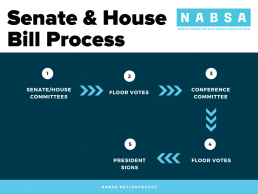New Federal Policies Include Favorable Provisions for Shared Micromobility
The past four weeks have seen important movements toward surface transportation reauthorization in the U.S. In May, the U.S. Senate Committee on Environment and Public Works (EPW) announced the release of a bipartisan surface transportation reauthorization bill, the Surface Transportation Reauthorization Act of 2021, and unanimously passed it. A couple of weeks later, the House Committee on Transportation and Infrastructure introduced the Investing in a New Vision for the Environment and Surface Transportation in America (INVEST in America) Act, a transformational, $547 billion surface transportation reauthorization bill. This bill builds off of the first House reauthorization bill, which was passed by the House last year, and did not make it to the Senate.
Building on the momentum of the House-approved INVEST Act last year, NABSA outlined our top four priorities for reauthorization in 2021. These are:
- Ensure that bikeshare and shared scooters are recognized as an associated transit improvement.
- Include shared micromobility as an eligible expense of the Congestion Mitigation and Air Quality Program
- Ensure passage of new climate programs, such as the Community Climate Innovation Grant proposed in the 2020 House-passed INVEST Act, and ensure eligibility for shared micromobility in these programs.
- Ensure that Commuter Tax Benefits extend to bikeshare and shared scooters
Here’s how the House and Senate reauthorization bills stack up to NABSA’s priorities so far:
Ensure that bikeshare and shared scooters are recognized as an associated transit improvement.
The House INVEST in America Act includes “bikeshare projects” and “charging stations and docks for electric micromobility devices” as associated transit improvements. This is more inclusive of shared micromobility equipment for all micro-modes than the previous bill that only recognized bikeshare as an associated transit improvement.
This priority is not applicable to the Senate bill, as transit policy is outside the jurisdiction of the EPW Committee.
Include shared micromobility as an eligible expense of the Congestion Mitigation and Air Quality (CMAQ) Program
The House bill includes all shared micromobility as eligible for CMAQ funding.
The Senate bill includes all shared micromobility as eligible for CMAQ funding.
Ensure passage of new climate programs, such as the Community Climate Innovation Grant proposed in the 2020 House-passed INVEST Act, and ensure eligibility for shared micromobility in these programs.
The House bill includes new programs like the Community Climate Innovation Grant. It is not yet clear if programs like this will embrace shared micromobility, however, if shared micromobility is included as an associated transit improvement as proposed, there could be a path toward eligibility.
The Senate bill includes eligibility for shared micromobility in the Surface Transportation Block Grant and the Congestion Relief Program.
Ensure that Commuter Tax Benefits extend to bikeshare and shared scooters.
It is not yet clear if the Bicycle Commuter Act will move through a surface transportation reauthorization or budget reconciliation process. However, there has been a positive indication for either possibility. At this time, it seems possible that the Bicycle Commuter Act will move forward through a reconciliation package, and additional language is being considered by members of the Ways and Means Committee that would open up the Act to shared scooters as well as the currently proposed bill that includes bikeshare.
Both bills are currently making their way through committee mark-ups. Next, both will go to their respective floors for a vote.
A Federal Definition for Micromobility
Additionally, NABSA has been keeping our eye on the movement toward a federal definition of micromobility, and has developed a recommended definition:
(A) Micromobility vehicle or device.—
(i) In general.—The term “micromobility vehicle or device” means a vehicle or device that—
(I) weighs not more than 135 pounds; and
(II) is designed primarily—
(aa) for human transport; and
(bb) to be used on paved roadways or on paths.
(B) Associated definition of shared micromobility.—
(i) the term “shared micromobility” means a transportation service that uses a micromobility vehicle or device.

Both bills move the needle on defining micromobility. While the Senate bill does not include a definition outright, it includes bikeshare and shared scooters as part of a definition of “New Mobility.” The House bill includes a definition of a micromobility device.
Federal recognition and support of shared micromobility as an important part of the American transportation ecosystem needs to be part of any plan to increase equity, respond to climate change and create good jobs. Now, more than ever, residents rely on shared micromobility to get to where they need to go. According to the 2019 Shared Micromobility State of the Industry Report, Americans took 136 million trips on shared bikes and scooters in 264 US cities in 2019. In doing so, we helped take tens of millions of car trips off of streets, making transportation systems safer, more sustainable, and more equitable. And when the COVID-19 pandemic struck, shared micromobility was there for people, helping support transit networks, fill transit gaps, and help essential workers get to where they need to go with affordable, socially distant transportation.
The addition of the above provisions will enable crucial investment in shared micromobility programs for the residents that rely on it to get to work and move around their communities, and incentivize shared micromobility as a transportation option that can help complete transit networks and make them more equitable, help improve air quality and reduce emissions, reduce congestion, and provide an accessible means for physical activity. The solidification of shared micromobility in transportation legislation will further propel our growth.
Learn more about NABSA’s advocacy work at nabsa.net/advocacy.
